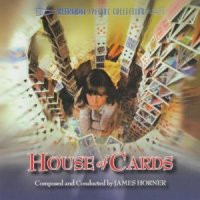- Composed by James Horner
- Intrada / 59m
Released in 1993 after sitting on the shelf for a couple of years, House of Cards stars Kathleen Turner and Tommy Lee Jones and is about a mother struggling to reconnect with her daughter after her father is killed. It disappeared virtually without trace when it was finally released and so is one of the more obscure entries in James Horner’s filmography (which includes, astonishingly, no fewer than nine other movies released in 1993).
The film offered the composer two of his favourite subjects to explore – spirituality (the young girl at the heart of the story delving into Mayan culture, her father having been killed in Mexico) and childhood innocence. It’s the former that is most on display in the lengthy opening cue “The Processional”, with familiar Horner ethnic percussion and flutes playing a lovely theme with a haunting quality (the composer would write a similar one for one of his final scores, The 33). Late in the piece the score’s main theme is introduced, for piano, and is lovely; it is in the second cue, “Arriving Home”, that we hear a joyful piece of childlike exuberance.

The spiritual side of the score is explored further in “Kindred Spirits”, full of expressionistic wind writing of the kind that Horner did so often in his “natural world” scores – perfectly conveying the sense of wind blowing through trees. When the strings roll and some subtle electronics are introduced midway through the cue, the music takes a darker turn for the first time – it’s a variant on the very familiar Horner suspense technique he employed so often around the time, but without the signature crashing pianos. Instead, the tension builds through the strings and reaches fever-pitch at one point before the composer calms things down and presents a truly lilting version of the main theme. In “The Quiero” Horner takes the theme and adds a pan flute motif in counterpoint which would later serve as a major theme in Mighty Joe Young.
“The Roof” opens with flute writing that could easily come from the later The Spitfire Grill but actually turns quite dark for a while, peril clearly being signalled. The flute material again opens up “House of Cards” but the track swells and swells and eventually reveals the score’s final major theme, an expression of joy and wonder with vague similarities to Cocoon. The idea is explored further in “Prime Numbers” – the theme only hinted at, but the feeling is the same.
In “Near Accident” things take a darker turn – suspenseful strings and chimes, a familiar sound to any fan of the composer but with an interesting twist here thanks to the distinctive flute solo laid on top. The two-part “Virtual Reality” explores the score’s “wonder theme” more – somewhat tentatively at first but presented almost in that “genius theme” style he used a few times (but not quite) – it’s a wonderful pair of cues. In between the two parts come “Distant Memories” which revisits the opening Mayan theme but with a more atmospheric, electronic timbre; and “Building the Helix” stands in total contrast to this, being outwardly happy and really very lovely. “The Dream” brings us more of that beautiful impressionistic wind writing before swelling up to a grand conclusion which leads into the finale “Reunion in Time”, which at first reverts back to the style of the opening cue with the Mayan mysticism (and that theme) but gradually moves from magic back to reality and concludes with a lush arrangement of the main theme.
Horner saves the best for last with a rapturous end title cue that sums up the score’s thematic material but in a much more rousing way than in the body of the score, as the little girl has finally reached her emotional catharsis. That closes an album which is consistently pleasant if only occasionally spectacular, the composer often showing off a more introspective style (appropriate for the film) and letting go of the reigns only at carefully-selected moments, most impressively in that end title piece.
Rating: *** 1/2
facebook.com/moviewave | twitter.com/MovieWaveDotNet | amazon.com












I just listened to this again today, for the first time in awhile. Its a really lovely score, indeed, one of my favourite scores by Horner. And I have never seen the movie. I bought the score when it came out really on something of a whim, but the samples clearly indicated it was my kind of Horner score- thoughtful and delicate. I don’t really go for his bombastic stuff- I really think the emotional scores are where the ‘true’ genius of Horner lies.
And this is really wonderful. Some lovely orchestrations and melodies.The first track is so good, I think its one of the very best pieces of music Horner ever did. Its great. Intrada had quite a spell back then releasing Horner scores, so glad I managed to pick them up. Pity scores like this cannot get an unlimited release though., it really deserves a wider audience. So sad to think Horner is gone now, hearing albums/scores like this, I begin to realise just what has been lost with his passing.